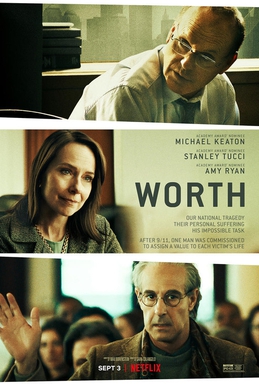Courtroom dramas don’t seem to be very popular these days and it’s difficult to think of many modern films which portray lawyers in a positive light. This isn’t quite a courtroom drama but it is about a lawyer doing heroic work so it comes close enough in my book. It’s a biography of Kenneth Feinberg who was in charge of the September 11th Victim Compensation Fund and so had to balance competing interests to decide how much compensation each victim of the attacks should receive. In terms of artistic merit, this isn’t that good a film but it does its job well enough and I really like the idea of having art shine more light on the lesser known bits and pieces that make civilization work
Kenneth Feinberg both runs a law firm with his partner and teaches law at Columbia University where he specializes in detailing how much a person’s life is worth in the eyes of the law. When the September 11 attacks occur, he is of course caught by surprise like everyone else but isn’t directly affected. Upon learning of the compensation fund set up to prevent victims from suing the airlines to bankruptcy, he volunteers to run the fund as its Special Master as a form of public service. His mandate is to persuade the families of the victims to agree to accept compensation according to a formula he devises by a fixed deadline. Many families however are upset at their loved ones being treated as a mere statistic while the families of the well paid finance executives who died are unsatisfied with the low ceiling. Many other families are also disqualified according to the rules due to their particular circumstances. Meanwhile an activist Charles Wolf whose wife died in the attack creates a website that details what he perceives are the many flaws in the fund’s rules and it quickly becomes very popular.
The contributions of someone like Feinberg during a disaster like 9/11 are of course less directly and viscerally heroic than that of the firefighters and other rescue workers. Nonetheless I believe that this type of work is also critical to the functioning of civilization and it is receives far less attention in the arts. A film is an imperfect medium through which to learn about Feinberg’s work but this one does a decently good job. I like how it emphasizes that as distasteful as it seems, when it comes to monetary compensation we do at the end of the day have to settle on a figure for each life. It also shows how impossible it is to achieve fairness and while most people would probably agree that a set of fixed rules seems fair, it can leave many people at opposite ends of the spectrum unhappy. Through stories like the gay partner of a victim and the wife of a firefighter who secretly had an affair and other children she never knew about, it also shows how no set of rules no matter how comprehensive and how well thought out, can ever hope to encompass the full complexity of human life.
The primary source of information used here is probably Feinberg’s own book What is Life Worth? Not having read that and not being an expert on the topic, it’s difficult to judge how historically accurate this account is. At least the families of the victims highlighted here seem to be based on real ones and Charles Wolf and his subsequent turnaround is real too. However watching this I couldn’t quite understand what prevented Feinberg from simply paying whatever amount of government money was necessary to make everyone happy. In reality the legislation that authorized the creation of the fund gave Feinberg a fixed budget to work with including administrative expenses which makes a lot more sense. The film tries to add a little drama by showing that Feinberg only understood the need to personally talk to the families one by one only fairly close to the deadline. He claims however that he personally presided over 900 of the 1,600 hearings to hear appeals from the families. To me, what is really incredible and what the film seems to take for granted is that Feinberg had near unlimited discretionary powers over the disbursement of a fantastically large amount of money and he was able to do the job without even the slightest hint of any form of impropriety or corruption.
An afterword explains that Feinberg would later go on to play a similar role in many other major cases but this rather understates how he became essentially the US government’s go-to person in all such cases. Anyway I’m glad this film exists and I’m happy to have watched this. I do concede that it is at best a workman-like biography that only presents the essential facts of a complicated situation and its subject matter is probably of little interest to most people. I also wish that more artistic types understood the importance of such work and tried to highlight them more as the lack of knowledge on how things work behind the scenes in administration is detrimental to the well-being of democracies.
